


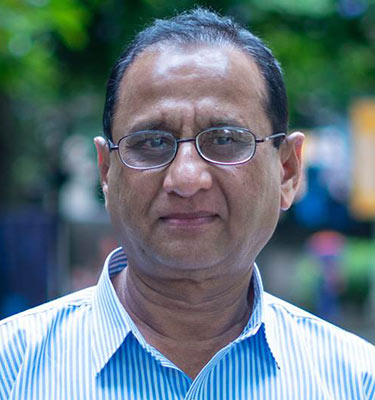



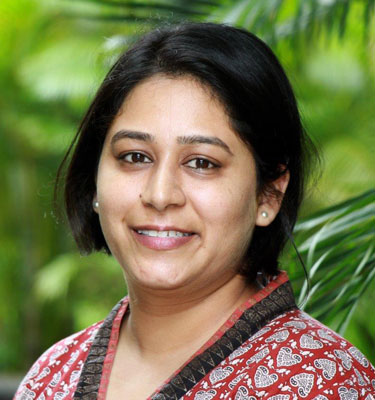
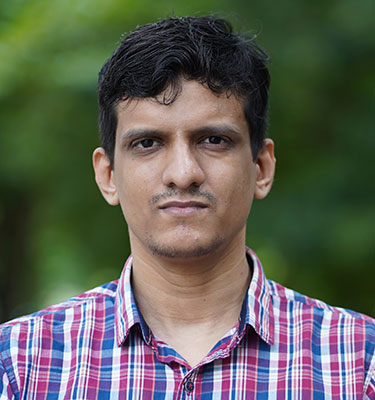

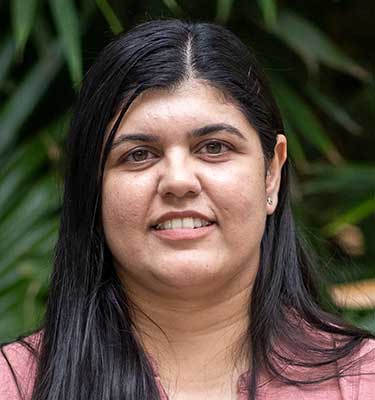


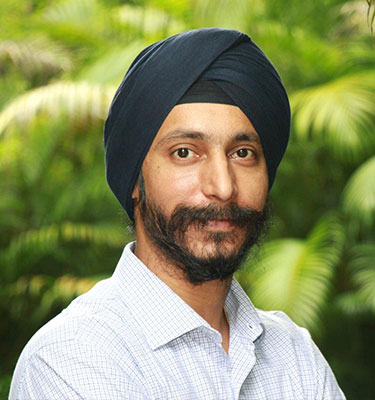

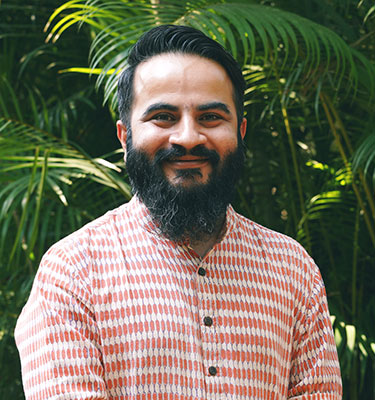





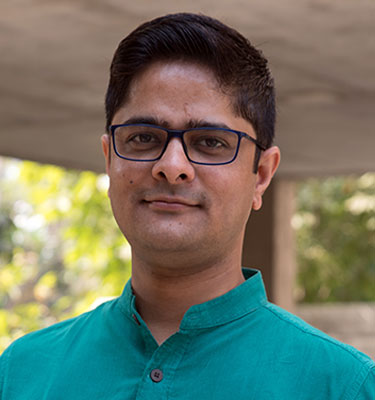


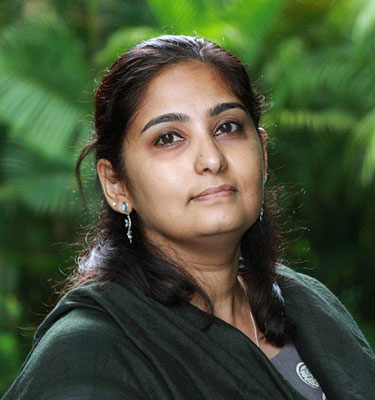
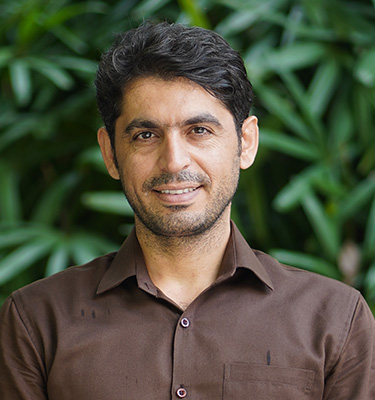


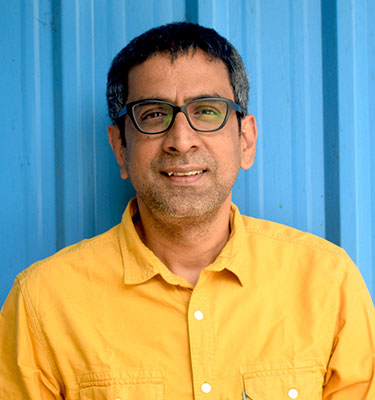


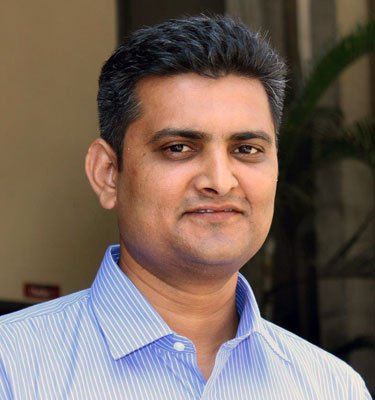

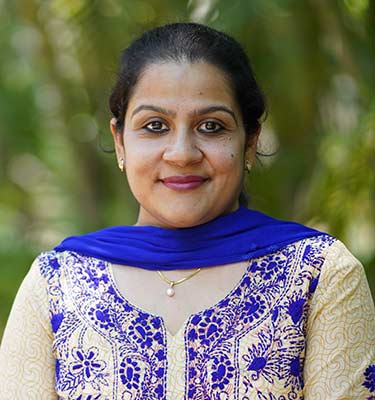

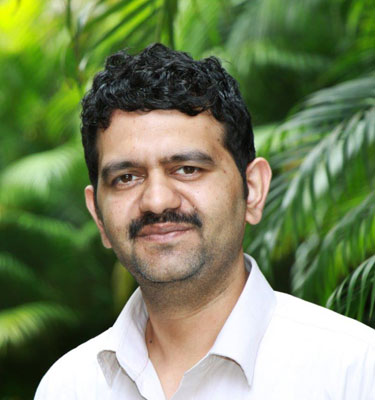




FACULTY
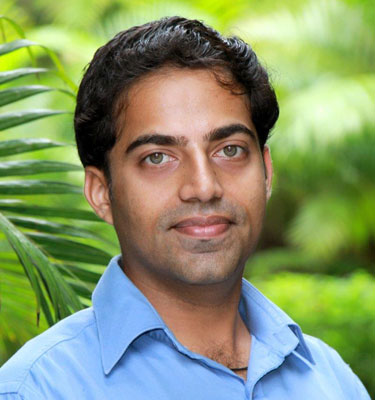
Prof. Sairaj Patki
Dr. Sairaj M. Patki has over 13 years of teaching experience including undergraduate and post-graduate courses at various colleges in Pune. Prof. Sairaj teaches the courses Abnormal Psychology and Experimental Psychology. Sairaj Patki has been a full-time faculty at Symbiosis College of Arts and Commerce and Modern College of Arts, Science and Commerce, and a visiting faculty at the Savitribai Phule Pune University (SPPU) (formerly Pune University), SNDT Women’s University and Fergusson College. He is also an academic counsellor, approved guide and examiner for Indira Gandhi National Open University (IGNOU) B.A. and M.A. Psychology programs and serves on the Board of Studies for Psychology for some institutions in Pune. He has worked as a joint director / co-investigator for an ICSSR Sponsored Research Project titled ‘Emotional intelligence among adolescents: Tool development and enhancement through training and study of correlates’.
He is a certified Emotional Intelligence Trainer and has conducted numerous workshops for schools, colleges and organizations including Reliance Industries Ltd., CID Office, Bajaj Auto, Modern Institute of Business Management, MIT Shillong, Pune People’s C-op Bank. He has also served as an observer on the FTII admission panels. Prof. Sairaj’s research interests lie in the areas of Cyberpsychology, Human-computer Interaction, AI, Emotional Intelligence, Personality and mental health. He has guided over 20 post-graduate research dissertations and has been a research consultant to Shantilal Muttha Foundation, NEALife and individual master’s and doctoral students.
He is also passionately involved in photography, cinematography, cooking, designing and aero-modelling.
Journal Publications
- Ravi, N., & Patki, S. M. (2025). Parasocial relationships, social support and well-being: A mixed-methods study among Indian youth. International Journal of Adolescence and Youth, 30(1), 2480712. https://doi.org/10.1080/02673843.2025.2480712 (SJR Q1, WoS Emerging SCI)
- Patki, S. M., Gandhi, P., Walawalkar, A. P., Goyal, A. A. (2024) Perceived social support, self-esteem, and depression among Indian trans men with and without sex reassignment surgery. Humanities and Social Sciences Communications, 11, 772. https://doi.org/10.1057/s41599-024-03270-4(SJR Q1, WoS SSCI, AHCI)
- Kapadia, A., & Patki, S. M. (2023). Effect of Fitspiration on State Self-Esteem Among Young Adults. Identity, 24(1), 45-63. https://doi.org/10.1080/15283488.2023.2253828 (SJR Q1)
- Patki, S. M., Iyer, A. (2022). Mental Health Communication on Social Media in India: Current Status and Predictors. In: Li, H., Ghorbanian Zolbin, M., Krimmer, R., Kärkkäinen, J., Li, C., Suomi, R. (eds) Well-Being in the Information Society: When the Mind Breaks. WIS 2022. Communications in Computer and Information Science, vol 1626. Springer, Cham. https://doi.org/10.1007/978-3-031-14832-3_6 (SJR Q4)
- Patki, S. & Ahuja, E. (2022). Gen Z’s identity amidst the artificial reality of social media. Journal of Media and Communication, 6(1), 35-48. (UGC CARE)
- Shah, S.S., Patki, S. M. (2020). Getting traditionally rooted Indian leadership to embrace digital leadership: Challenges and way forward with reference to LMX. Leadership, Education, Personality: An Interdisciplinary Journal, 2, 29–40. https://doi.org/10.1365/s42681-020-00013-2
- Rajankar, P., & Patki, S. M. (2019). Eat well: smart intervention plan for bulimia in the Indian context. Journal of Psychosocial Research, 14(2), 335-344. DOI:10.32381/JPR.2019.14.02.11
- Sastry, A., & Patki, S. M. (2018). Gender differences in personality, motivation and the tendency to follow social networking trends among Indian millennials. Journal of Psychosocial Research, 13(2), 369-380.
- Pimple, J., Sharma, R., & Patki, S. M. (2018). Stress indicators among college students: A correlational study of family environment and drinking temptation. Stress Management Professional: An International Journal, 6(1), 31-35.
- Patki, S. M. (2018). Who will leave greener footprints? Materialistic values, motivation and pro-environmental behaviors among college students. Journal of Psychosocial Research, 13(1), 121-129.
- Autade, S., & Patki, S. M. (2016). Reducing sexism among teenagers through a gender-sensitization module. International Journal of Indian Psychology, 4(1), 146-147.
- Patki, S. M., & Abhyankar, S. C. (2016). Extending hierarchical regression analysis to achieve control and moderation simultaneously. International Journal of Psychological Research, 5(2), 104-107.
- Patki, S. M. (2016). Sex-related differences in hue discrimination: A computer-based experimental study. Journal of Contemporary Psychological Research, 3(2), 8-12.
- Kulkarni, N., & Patki, S. M. (2017). A study of emotional intelligence, experienced bullying and psychological well-being among secondary school students from boarding schools. International Journal of Indian Psychology, 3(4), 12-27.
- Patki, S. M. (2016). Perceived social support and psychological well-being among teenagers: The role of gender and optimism. Indian Journal of Health & Wellbeing, 7(7), 691-694.
- Jhaveri, S. S., & Patki, S. M. (2016). Locus of control, peer influence on dieting, media exposure and body image satisfaction in young adults. Indian Journal of Health and Wellbeing, 7(4), 369-372.
- Patki, S. M., & Abhyankar, S. C. (2016). Big-five personality factors as predictors of organizational citizenship behavior: A complex interplay. The International Journal of Indian Psychology, 3(2), 136-146.
- Patki, S. M., & Abhyankar, S. C. (2014). Citizenship behaviors directed towards individuals and the organization: A study among bank clerical employees. Indian Journal of Positive Psychology, 5(3), 322-324.
- Patki, S. M. (2012). A psychological analysis of consumer-brand relationship in determining consumer loyalty. International Journal of Engineering, Science and Research, 101-103.
- Patki, S. M. (2012). Demographic ageing: Turning liability into asset. Proceedings of the UGC Sponsored National Dandekar memorial Seminar on Inclusive Growth, 43-47. ISBN 978-81-921046-0-7.
Edited Book
- Patki, S. M., & Abhyankar, S. (Eds.) (2024). Organizational citizenship behaviour (OCB) in India: Emerging trends and future directions. Springer.
Book chapters
- Shah, S. S., & Patki, S. M. (2025) Understanding Political and Diplomatic Leadership and Personality Characteristics in Asia through the Lens of Political Psychology. In D. Balan, & E. Pankaj (Eds.), Making a Stronger Case for Multidisciplinary Approaches to the Study and Practice of Indian Diplomacy. Organisation for Research on China and Asia (ORCA).
- Gupta, M., Patki, S., Valadi, J.K. (2025). Detecting Depression: Employing Natural Language Processing and Random Forests. In: Bansal, J.C., Sharma, H., Chakravorty, A. (eds) Congress on Smart Computing Technologies. CSCT 2022. Smart Innovation, Systems and Technologies, vol 396. Springer, Singapore. https://doi.org/10.1007/978-981-97-8096-9_8 (SJR Q4)
- Sengupta, A., Patki, S. M. (2025). When Mere Awareness May Not Lead to Sustainable Climate Change Action: Exploring Psychological Barriers in Pro-environmental Behaviours. In: Pon Selvan, C., Sehgal, N., Ruhela, S., Rizvi, N.U. (eds) International Conference on Innovation, Sustainability, and Applied Sciences. ICISAS 2023. Signals and Communication Technology. Springer, Cham. https://doi.org/10.1007/978-3-031-68952-9_68
- Goswami, V., Manghrani, H., & Patki, S. M. (2024) Fictional Fascination & The Science Behind Our Imaginary Bonds. In S. Uniyal, & D. Singh (Eds.), Human Cognition: In the Digital Era.
- Ravi, N., & Patki, S. M. (2024) Parasocial relationship and well-being in youth: A mixed method study. In S. Uniyal, & D. Singh (Eds.), Human Cognition: In the Digital Era.
- Gujar, N., Patki, S. M., & Sethi, T. (2024). ‘New Norms for the New Normal?’ Evaluating and Enhancing Employee OCB Amidst Evolving Work Environments. In S. M. Patki, & S. Abhyankar (Eds.), Organizational Citizenship Behaviour (OCB) in India: Emerging Trends and Future Directions (pp. 165-176). Springer Nature Singapore.
- Patki, S. M., & Choudhuri, A. (2024). ‘Good Apples and Bad Apples: Is it the Apples, the Basket, or the Climate?’ Motivational Forces Behind OCB and CWB In S. M. Patki, & S. Abhyankar (Eds.), Organizational Citizenship Behaviour (OCB) in India: Emerging Trends and Future Directions (pp. 165-176). Springer Nature Singapore.
- Jayaraman, V. K., Pandya, M., Malhotra, M., & Patki, S. M. (2024). AI in the Context of OCB: One Step Forward or Two Steps Back? In S. M. Patki, & S. Abhyankar (Eds.), Organizational Citizenship Behaviour (OCB) in India: Emerging Trends and Future Directions (pp. 165-176). Springer Nature Singapore.
- Sengupta, A., Patki, S. M., Kumar, P., & Sureka, V. (2023). Knowing vs doing: Psychological barriers in pro-environmental behaviour. In Jaggi, P. & S. Kavita (Eds.), Environmental Psychology. Kitab Mahal. ISBN: 9789392080708
- Budki, A., Raman, A., Thiruvillakkat, A., Dhara, Baby, H., Mistry, H., Ajmera, P., Pasad, R., Bhutada, R., Mukherji, S., Ganesh, S., Bhasin, S., Mehta, S., Tono, T., & Patki, S. M. (2023). Dava aur Dua: Confluence of Science and Spirituality. In P., Gandhi, & R., Kisana (Eds.), Discovering India: An experiential journey of society and culture (pp. 12-21). Himalaya Publishing House Pvt. Ltd. ISBN 9789358400366
- Patki, S. M., Namjoshi, S. (2020). Hashtag illness: Illness beliefs and behaviours in the context of social media. In Srivastava, S. K. & K. Sharma (Eds.), Health care challenges in India: Psycho-social perspectives (pp. 230-245). Global Vision Publishing House.
- Kulkarni, N., & Patki, S. M. (2019). Fostering students’ psychological well-being amidst the threat of bullying: Emotional intelligence may hold the key. In Barton, G. & S. Garvis (Eds.), Compassion and empathy in educational contexts (pp. 97-117). Palgrave Macmillan, Cham.
- Patki, S. M. (2017). Perceived social support, degree of internet addiction and psychological wellbeing among urban teenagers. In Upadhyay, D. K. & A. Manju (Eds.), Youth, mental health, well-being and development issues (pp. 46-62). Bharti Publications.
Others
- Patki, S. M. , Joshi, O., & Das, R. (2023). A Cognitive and Socio-cultural Perspective on the Tendency to Use Gmail’s Smart Reply-like AI-based Texting Features. Proceedings of the 13th Asian Conference on Psychology and the Behavioral Sciences, International Academic Forum (IAFOR), Japan. ISSN 2433-7544 (Online) ISSN 2433-7587 (Print)
- Patki, S. M., Deshpande, L., Dehadray, V., Moghe, V., Desai, M., Shinde, V., & Hegde, M. (2023). Bridging the digital divide in online learning in Maharashtra, India: Learnings from the pandemic. Proceedings of The 6th International Conference on New Trends in Teaching and Education. https://www.doi.org/10.33422/6th.ntteconf.2023.05.101
- Patki, S. M., & Das, R. (2021). Human Communication in the context of AI-based messaging: Algorithm for a global language? International Journal of Psychology, 58(1), 250. https://doi.org/10.1002/ijop.12991 (SJR Q1)
- Shantilal Muttha Foundation (2021). Study on tech-based distance education for primary school students in Maharashtra during COVID-19: Approaches, challenges, and implications. https://mutthafoundation.org/pdf/reports/Research_Tech_based_Distance_Education_during_COVID_Maharashtra_Eng_Summary.pdf
- Abstract ‘Personality, Perceived Leadership Style, HRD Climate, Perceived Social Support and Organizational Citizenship Behavior in Bank Clerical Employees’ published in Manashastra Patrika of the Marathi Manashastra Parishad, issue 24-25, December, 2016, ISSN 2394-4730
Funded Research Project
- Joint Director for sanctioned research project titled ‘Emotional Intelligence among Adolescents: Tool Development and Enhancement through Training and Study of Correlates’ under the Sponsored Research Project program of the ICSSR (funding amount: Rs 17 lakhs), December 2015 – June 2018

